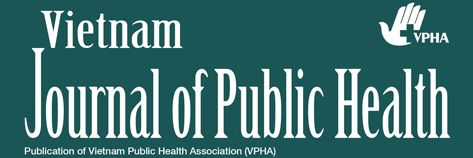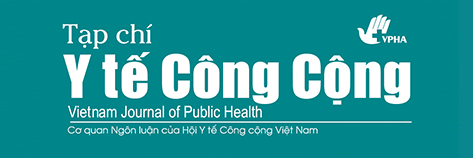Validity and reliability of a food frequency questionnaire to assess habitual dietary intake in Northern Vietnam
Abstract
The two main objectives of this study were (1) to investigate the face and content validity, and test-retest reliability of a modified food frequency questionnaire (FFQ) originally developed in South Vietnam, and (2) to effectively quantify and monitor habitual dietary intake for the NorthernVietnamese population. Seventy community-dwelling adults were recruited from four provinces in the North Vietnam by convenience sampling. An „experience-based‰ approach involving 20 focus group participants was adopted to modify the existing instrument. The revised FFQ was then piloted among 20 adults. Test-retest reliability was assessed by face to face interviewing another group of 30 adults twice with an interval of 21 days using the piloted FFQ. The final questionnaire contained 128 food and beverage items after modifications and refinement based on the qualitative data obtained. Face validity and content validity were confirmed by the pilot test. Reasonable reproducibility between repeated administrations of the FFQ was also evident, with intra-class correlations ranging from 0.15 to 0.83 for 15 main food groups. The modified FFQ appeared to be a suitable instrument to evaluate habitual dietary intake of adults in the North Vietnam.
Keywords
Full Text:
Download PDFReferences
WHO. Vietnam Noncommunicable Disease Prevention and Control Programme 2002-2010 Implementation Review. 2011.
WHO. 2008-2013 Action Plan for the Global Strategy for the Prevention and Control of Noncommunicable Diseases. Geneva: WHO press;2008.
WHO. Global status report on noncommunicable diseases 2010. Geneva2011.
Cantwell MM, Gibney MJ, Cronin D, et al. Development and validation of a food-frequency questionnaire for the determination of detailed fatty acid intakes. Public Health Nutr. 2005;8(01):97-107.
Arab L. Biomarkers of Fat and Fatty Acid Intake. J Nutr. March 1, 2003 2003;133(3):S925-932.
Actis AB, Perovic NR, Defagó D, Beccacece C, Eynard AR. Fatty acid profile of human saliva: a possible indicator of dietary fat intake. Arch Oral Biol. 2005;50(1):1-6.
Magkos F, Yannakoulia M. Methodology of dietary assessment in athletes: concepts and pitfalls. Current opinion in clinical nutrition and metabolic care. Sep 2003;6(5):539-549.
Cade JE, Burley VJ, Warm DL, Thompson RL, Margetts BM. Food-frequency questionnaires: a review of their design, validation and utilisation. Nutrition research reviews. Jun 2004;17(1):5-22.
Jayawardena R, Swaminathan S, Byrne NM, Soares MJ, Katulanda P, Hills AP. Development of a food frequency questionnaire for Sri Lankan adults. Nutrition journal. 2012;11(63).
Wakai K. A Review of Food Frequency Questionnaires Developed and Validated in Japan. J Epidemiol. 2009;19(1):1-11.
Hong TK, Dibley MJ, Sibbritt D. Validity and reliability of an FFQ for use with adolescents in Ho Chi Minh City, Vietnam. Public Health Nutr. 2010;13(03):368-375.
Khan NC, Mai LB, Hien VTT, et al. Development and Validation of Food Frequency Questionnaire to Assess Calcium Intake in Postmenopausal Vietnamese Women. J Nutr Sci Vitaminol (Tokyo). 2008;54(2):124-129.
Kusama K, Nguyen Trung Le DS, Hanh TTM, et al. Reproducibility and Validity of a Food Frequency Questionnaire among Vietnamese in Ho Chi Minh City. J Am Coll Nutr. December 2005 2005;24(6):466-473.
Ngoan le T, Khan NC, Mai le B, et al. Development of a semi-quantitative food frequency questionnaire for dietary studies focus on vitamin C intake. Asian Pacific journal of cancer prevention : APJCP. Jul-Sep 2008;9(3):427-432.
Yatsuya H, Ohwaki A, Tamakoshi K, et al. Reproducibility and Validity of a Simple Checklist-type Questionnaire for Food Intake and Dietary Behavior. J Epidemiol. 2003;13(5):235-245.
Lee KY, Uchida K, Shirota T, Kono S. Validity of a self-administered food frequency questionnaire against 7-day dietary records in four seasons. J Nutr Sci Vitaminol (Tokyo). Dec 2002;48(6):467-476.
Uenishi K, Ishida H, Nakamura K. Development of a Simple Food Frequency Questionnaire to Estimate Intakes of Calcium and Other Nutrients for the Prevention and Management of Osteoporosis. J Nutr Sci Vitaminol (Tokyo). 2008;54(1):25-29.
Date C, Fukui M, Yamamoto A, et al. Reproducibility and Validity of a Self-administered Food Frequency Questionnaire Used in the JACC Study. J Epidemiol. 2005;15(Supplement_I):S9-S23.
Kesse-Guyot E, Castetbon K, Touvier M, Hercberg S, Galan P. Relative validity and reproducibility of a food frequency questionnaire designed for French adults. Annals of nutrition & metabolism. 2010;57(3-4):153-162.
Willett W. Nutritional Epidemiology. 2nd ed. New York: Oxford University Press; 1998.
Kim J, Kim DH, Ahn YO, et al. Reproducibility of a food frequency questionnaire in koreans. Asian Pacific journal of cancer prevention : APJCP. Jul-Sep 2003;4(3):253-257.
Ogawa K, Tsubono Y, Nishino Y, et al. Validation of a food-frequency questionnaire for cohort studies in rural Japan. Public Health Nutr. 2003;6(02):147-157.
Wengreen HJ, Munger RG, Wong SS, West NA, Cutler R. Comparison of a picture-sort food-frequency questionnaire with 24-hour dietary recalls in an elderly Utah population. Public Health Nutr. 2001;4(05):961-970.
Hartman AM, Block G, Chan W, et al. Reproducibility of a self‐administered diet history questionnaire administered three times over three different seasons. Nutr Cancer. 1996/01/01 1996;25(3):305-315.



